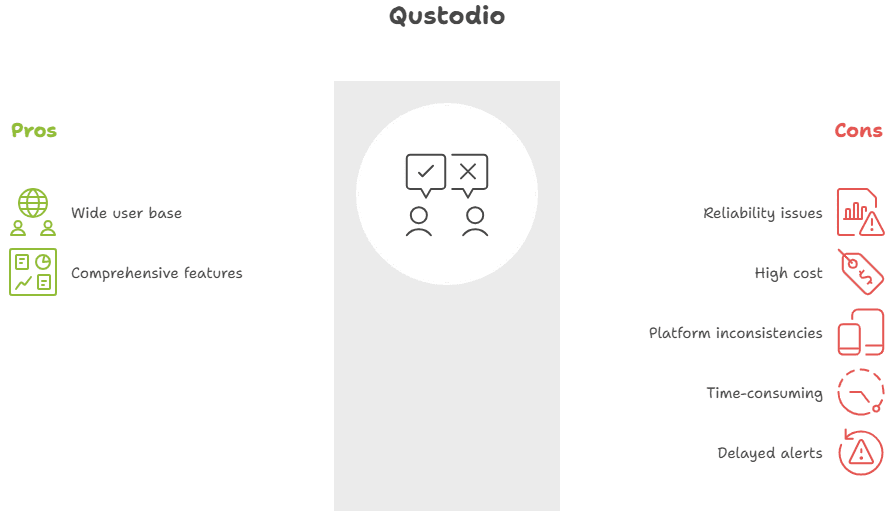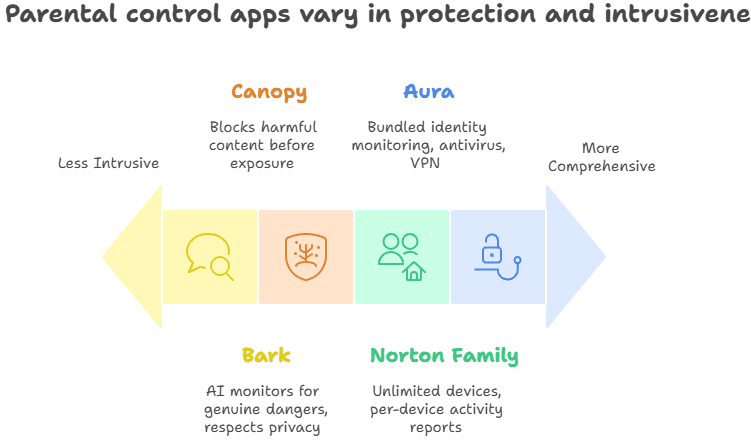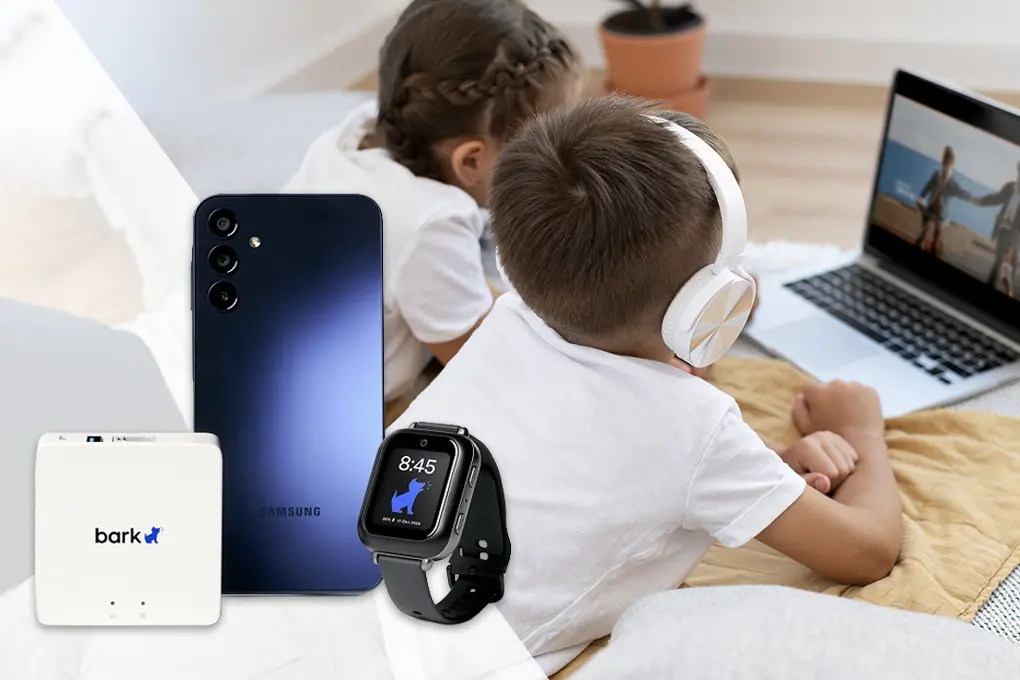Keeping kids safe online isn’t optional anymore. With cyberbullying impacting over 20% of U.S. teens and nearly one in five missing school because of online harassment, parents need tools that actually work.
Qustodio is a solid option, but its $99.95 per year price tag and feature gaps leave many families looking elsewhere.
If that sounds familiar, you’re in the right place. Here are 4 apps like Qustodio worth your attention in 2025 – Bark, Aura, Norton Family, and Canopy – each offering smarter monitoring, stronger protection, and better value for your family.
Table of Contents
- Key Takeaways
- The Growing Need for Digital Protection
- Qustodio’s Limitations
- Top Qustodio Alternatives for 2025
- How We Evaluated These Apps
- Which Solution Matches Your Family’s Needs?
- Making the Right Choice for Your Family
- When to Make the Switch
- What Happens After Families Switch?
- Our Verdict
- The Bottom Line on the Best Qustodio Alternatives
- Frequently Asked Questions
Key Takeaways
- Qustodio’s high cost and reliability issues have driven many families to seek alternatives with better features and faster alerts.
- Cyberbullying affects over 26% of U.S. teens, making timely and accurate parental control tools more critical than ever.
- Bark offers AI-driven context-based monitoring, catching coded language and subtle risks that keyword filters miss.
- Aura combines parental controls with identity protection, antivirus, and VPN, protecting the entire household’s digital footprint.
- Norton Family provides unlimited device coverage at $49.99 per year, making it ideal for large families on a budget.
- Canopy prevents exposure to harmful content entirely, using real-time AI scanning suited for younger children.
- Visit Batten’s marketplace to compare these vetted options and choose the best parental control solution for your family.
The Growing Need for Digital Protection
According to recent WHO research, one in six school-aged children now experiences cyberbullying, with adolescents spending up to 6 hours online daily. The statistics paint a concerning picture: cyberbullying incidents have risen from 16.7% to 26.5% among US teens between 2016 and 2023, making robust parental controls more critical than ever.
Qustodio’s Limitations
Qustodio may serve more than seven million families, but parent feedback across forums and review platforms highlights recurring frustrations that push many to consider alternatives.

Reliability
The most frequent issue is reliability. Many parents report that features work flawlessly during the free trial, only to malfunction after upgrading to a paid plan. Call and text monitoring, one of Qustodio’s premium selling points, often stops functioning on Android after system updates. As one parent noted, “I specifically paid for text monitoring to watch for bullying. It worked for two weeks, then nothing. Support just told me to reinstall.”
Cost
Cost is another major concern. The $54.95 Basic plan excludes YouTube monitoring, despite the fact that 79% of youth cyberbullying occurs on YouTube. To access full features, parents must upgrade to the $99.95 Complete plan, which ends up more expensive than several competitors offering broader protection. For households with multiple children, this pricing gap grows even more significant.
Inconsistencies
Platform inconsistencies also create frustration. The panic button, potentially critical during emergencies, works only on Android. iPhone users who want call monitoring must leave a Mac computer running at all times, a requirement most parents discover only after purchasing. These limitations are rarely clear upfront, leading to disappointment and frequent refund requests.
Key Insight
Parents spend an average of 15-20 minutes daily combing through Qustodio’s dashboard to review flagged activities, based on user reports. Over the course of a year, that amounts to nearly 100 hours – time better spent having real conversations with their children. To make matters worse, alerts for inappropriate content often arrive hours late, removing the opportunity for immediate intervention.
Read our guide on setting up parental controls on different devices for more information about how to keep your kids protected when online.
Top Qustodio Alternatives for 2025
Let’s now take a much closer look at the top Qustodio alternatives for 2025.
1. Bark – Best Overall Alternative
Price: $99/year (Premium) or $49/year (Jr)
Available at: Bark on Batten Marketplace: $14/month

Bark consistently delivers what Qustodio promises but fails to achieve: reliable monitoring that protects children while respecting their privacy. Parents looking for Qustodio alternatives often find Bark’s balance between safety and trust unmatched, especially for families with teens who dislike constant surveillance.
The best feature is Bark’s AI-powered detection system. Unlike keyword-based tools that miss evolving slang, Bark understands context. Parents frequently report the app catching subtle warning signs such as phrases like “unalive” or coded emoji combinations that suggest bullying, self-harm, or drug use. This context-aware approach helps parents intervene before problems escalate.
Equally important is how teens respond to Bark. Because the system only alerts parents about genuinely concerning content, teens maintain a sense of independence while parents remain informed about real risks. This fosters better communication at home.
Parents who switch from Qustodio often note fewer false alerts, quicker notifications (minutes rather than hours), and improved trust with their kids.
Bark’s practical advantages extend beyond monitoring. The app runs efficiently in the background, using only about 3% battery daily compared to Qustodio’s 11%, ensuring devices last through the entire school day.
It also supports unlimited children and devices under one subscription, making it cost-effective for larger families. Setup is straightforward and covers everything from social media to email, YouTube, and text messages without requiring multiple installations.
Key Insight
Battery efficiency has become a key differentiator in parental control apps. Parents report that Bark’s lightweight monitoring prevents the constant dead-phone issue common with Qustodio. This reliability ensures teens can stay reachable during after-school activities or emergencies.
Why Bark Stands Out
Bark’s feature set goes far beyond monitoring. It offers screen time scheduling, web and app blocking with 19 filter categories, and location tracking with check-ins and alerts. Parents also receive expert guidance with each alert, including talking points from child psychologists, making it easier to address sensitive issues constructively.
The pricing remains competitive at $168/year for Premium, especially considering unlimited device support and same-day access to alerts.
With more than 19,000 five-star reviews and recognition from outlets like CNN, Forbes, and Good Morning America, Bark has established itself as the gold standard for digital safety. For parents frustrated with Qustodio’s gaps in reliability and speed, Bark offers a smoother experience with stronger protection and better value.
2. Aura – Best All-in-One Family Protection
Price: $120/year (Family Plan)
Available at: Aura on Batten Marketplace

Aura approaches family digital safety from a broader perspective than Qustodio. Instead of focusing solely on content filtering, it protects the entire household’s online presence: from kids’ gaming accounts to parents’ credit cards. This holistic approach often stops threats before they ever reach your child’s devices.
At the core of Aura’s parental controls is Circle technology, paired with identity theft monitoring, antivirus, and a built-in VPN. This combination pays off in real-world scenarios. For example, one family reported Aura detecting fraudulent credit card activity tied to their child’s compromised gaming account – something Qustodio’s monitoring alone would never catch.
Families with gamers find Aura especially valuable. Its Safe Gaming feature monitors in-game chats across more than 200 PC titles, including Minecraft, Fortnite, and Roblox. Parents routinely cite this as a lifesaver, flagging toxic behavior and predatory messages that most parental control apps fail to address.
Cost-wise, Aura delivers strong value by consolidating multiple services. Instead of paying separately for parental controls, antivirus, VPN, and identity monitoring, often totaling $300 or more annually. Aura bundles them for $120/year with unified management in one dashboard. This simplicity appeals to busy parents managing multiple devices and security needs.
Key Insight
Children are prime targets for identity theft because of their clean credit histories and unused Social Security numbers. Aura continuously monitors for misuse and sends alerts immediately, helping families resolve fraud before it escalates. This type of identity protection is absent in Qustodio and most other parental control apps.
Why Aura Stands Out
Aura is more than just screen time limits and website filters. It provides full-family protection with tools like real-time fraud alerts, VPN for secure browsing, and antivirus to block malware before it reaches your devices. Its parental controls remain competitive with top apps, while its extra layers of security protect parents and children alike.
For families that want an all-in-one solution, especially those with heavy gaming activity or multiple devices, Aura offers unmatched value and coverage compared to single-purpose apps like Qustodio.
3. Norton Family – Best Budget Option
Price: $49.99/year standalone or bundled with Norton 360

Norton Family proves that strong parental controls do not need a premium price tag. At about half the cost of Qustodio, it provides unlimited device coverage and features that often outperform more expensive apps.
Families with multiple children benefit most, as Norton separates activity reports by individual device. This eliminates confusion and helps pinpoint which child is responsible for specific online activity. One family uncovered their middle child’s late-night gaming habits only because Norton flagged their Xbox activity separately.
A great feature is School Time, designed for remote learning. It blocks distractions like Discord or gaming sites while allowing educational platforms such as Khan Academy and YouTube’s learning channels. Parents praise this flexibility, noting that Qustodio’s all-or-nothing blocking often disrupts legitimate schoolwork and frustrates kids during online classes.
Norton also excels at bypass prevention. Tech-savvy teens frequently find workarounds for parental controls, but Norton’s safeguards against VPNs, proxies, and safe-mode booting make it difficult to bypass. Parents consistently highlight this reliability, reporting fewer technical headaches and stronger peace of mind.
Key Insight
At $49.99 per year, Norton Family covers unlimited devices, making it cost-effective for large households. When bundled with Norton 360, families gain antivirus, VPN, and identity protection at an even better value. One family with six children calculated they saved more than $140 annually compared to Qustodio’s premium plan while gaining stronger features and security.
Why Norton Family Stands Out
Norton combines affordable pricing with dependable monitoring and unique tools like School Time and detailed device-level reporting. Its long-standing expertise in cybersecurity shows in its robust bypass prevention and polished user experience. For parents balancing cost, reliability, and broad coverage, Norton Family offers one of the strongest value propositions available today.
4. Canopy – Best for Content Filtering
Price: $95.99/year (up to 3 devices) or $119.99/year (up to 10 devices)

Canopy focuses on prevention rather than alerts, blocking harmful content before it ever appears on your child’s device. This makes it especially valuable for younger children or families wanting to shield kids from accidental exposure entirely.
Parents consistently praise Canopy’s real‑time AI scanning, which analyzes both images and text to ensure safe results. One parent shared how their 9‑year‑old’s search for “pussy cats” returned only wholesome images, sidestepping the problematic results that basic keyword filters would have missed.
The app also excels at sexting prevention. Canopy detects explicit images across messaging apps and blocks them instantly, replacing the content with a neutral notice. This protects children from both receiving and sending inappropriate images, offering peace of mind without exposing them to harmful visuals.
Key Insight
Canopy’s context‑aware filtering is ideal for mixed‑age households. Teens researching anatomy for school can still access legitimate educational content, while younger siblings remain shielded from unrelated explicit material. This adaptive approach reduces the frustration that often comes with one‑size‑fits‑all parental controls.
Why Canopy Stands Out
Qustodio notifies parents after exposure, but Canopy prevents it altogether. For families prioritizing proactive safety, Canopy’s filtering technology offers an unmatched layer of protection. With annual plans starting at $95.99 for up to three devices or $119.99 for up to ten devices, it delivers comprehensive filtering at an accessible price.
How We Evaluated These Apps
Our recommendations are based on hands-on testing of each parental control app and extensive feedback from real parents in online communities and security forums. We prioritized practical performance over marketing claims, focusing on how these tools actually work in everyday family scenarios.
We evaluated each app on setup complexity (can a non-technical parent install it easily?), day-to-day usability (are alerts timely and understandable?), and overall family impact (do teens tolerate the monitoring or constantly look for ways around it?). Special attention was given to how each app handles shared devices, hand-me-down phones, and frequent iOS and Android updates that often break features.
Parent insights were critical. Through user reviews and direct conversations, patterns emerged. Qustodio users often reported the same recurring frustrations, while parents using alternatives like Bark, Aura, Norton Family, or Canopy described meaningful improvements in both safety and family harmony.
Which Solution Matches Your Family’s Needs?
Each family’s situation is different. Below, we highlight which apps tend to work best for specific needs, from younger children to large families managing multiple devices.

Families With Elementary School Children
Parents of younger kids face constant worry about accidental exposure to harmful content. Innocent searches can produce traumatic results, and even educational YouTube videos can autoplay into disturbing material.
For these families, Canopy stands out. Its prevention-first filtering blocks harmful content before children ever see it, avoiding after-the-fact alerts. Parents frequently note the difference in peace of mind. One mother explained, “With Qustodio, I’d get a notification about something my daughter already saw.
With Canopy, she just sees a blocked message and moves on.”
Canopy’s context-aware filtering also supports homework without over-blocking. Educational content stays accessible, while inappropriate material remains blocked. Families say this reduces frustration compared to Qustodio’s more rigid filters.
Parents Navigating the Teen Years
Teenagers need protection without feeling constantly surveilled. Overly aggressive monitoring often backfires, pushing teens toward secrecy or alternate devices, yet risks like cyberbullying and predatory behavior cannot be ignored.
Bark strikes this balance well. Its AI-driven alerts focus on genuine dangers, respecting privacy while keeping parents informed. Many families report improved communication because teens view Bark as protective rather than intrusive.
The AI’s ability to recognize coded language and memes related to depression or bullying adds another layer of safety.
One father shared, “My daughter finally opened up about being bullied because she knew I’d see it through Bark anyway. Before Bark, she hid everything.”
Large Families on Tight Budgets
Parental control costs can escalate quickly for households with multiple kids. Qustodio’s device limits often force tough choices, and upgrading to unlimited coverage nearly doubles the price.
Norton Family solves this with unlimited device protection for $49.99 annually.
It provides per-device activity reports, helping parents pinpoint which child needs intervention rather than lumping all activity together.
Families also praise Norton’s stability. It avoids the constant troubleshooting and random feature failures common with other apps, offering a “set it and forget it” experience that busy parents appreciate.
Security-Conscious Households
For some families, online safety goes beyond filtering websites. Identity theft, compromised gaming accounts, and broader cybersecurity threats are increasingly common for children.
Aura addresses these risks with a comprehensive approach.
Alongside parental controls, it offers identity monitoring, antivirus, and VPN services for the entire household. Parents report catching threats Qustodio would never detect, such as Social Security numbers exposed in school data breaches.
For families already paying separately for antivirus, VPNs, and identity monitoring, Aura’s bundled service consolidates everything into one platform, saving both time and money.
Making the Right Choice for Your Family
Choosing the right parental control app starts with understanding your family’s priorities, comfort with technology, and budget. Each of the top alternatives to Qustodio, including Bark, Aura, Norton Family, and Canopy, offers different strengths, so matching their capabilities to your needs is essential.
Consider Your Children’s Ages
Younger children typically need strict prevention tools like Canopy or Norton Family, which block harmful content before it appears.
Teenagers often respond better to Bark’s more respectful monitoring, which focuses on genuine risks while preserving trust. Choosing the wrong style can either strain relationships or leave dangerous gaps in protection.
Match the App to Your Tech Comfort
Parents who prefer simple, all-in-one solutions frequently choose Aura, which combines parental controls with identity monitoring, antivirus, and VPN services.
Norton Family also keeps setup straightforward with an intuitive dashboard. Bark requires slightly more trust in its AI-powered detection but rewards that trust with accurate alerts and minimal false positives.
Look Beyond Sticker Price
Budget considerations extend beyond subscription costs. Aura can replace multiple tools you may already pay for separately, like VPNs or identity monitoring. Norton Family’s unlimited device coverage is ideal for large households, avoiding the need to pick which children’s devices get protection.
Check Device Compatibility
Ensure the app supports all current and future family devices. Bark and Norton Family cover iOS, Android, Windows, Mac, and Chromebooks, making them the most versatile for families with mixed devices.
Align With Your Parenting Philosophy
Some parents prefer Canopy’s prevention-first approach, while others appreciate Bark’s balance of safety and privacy. The best choice is the one that fits your values and strengthens, not disrupts, family dynamics.
When to Make the Switch
If you are currently using Qustodio, certain signs indicate it may be time to move on. These can stem from technical problems, family dynamics, or financial concerns.
Watch for Technical Red Flags
Delayed alerts, failed call monitoring, excessive battery drain, and kids easily bypassing restrictions are common issues. These problems rarely resolve and reflect Qustodio’s core design rather than temporary glitches.
Notice Family Friction
If arguments about “spying” dominate conversations or alert fatigue causes you to ignore notifications, the app is no longer working as intended. Overly aggressive filtering that blocks legitimate homework sites can also lead to daily frustrations for younger kids.
Factor in Cost and Coverage Gaps
Qustodio’s device limits and premium features often push families toward expensive upgrades. If you still need separate tools for antivirus, VPN, or identity monitoring, switching to an all-in-one option like Aura can simplify your setup and save money long term.
What Happens After Families Switch?

Parent reviews and forum discussions reveal a consistent pattern: families that switch to Bark, Aura, Norton Family, or Canopy experience better safety, fewer arguments, and improved communication with their kids.
Dramatic Improvement in Alert Quality
Parents using Bark report fewer but more meaningful alerts. Instead of dozens of daily notifications about harmless content, they receive two or three weekly alerts about genuine concerns, making it easier to respond quickly when needed.
Comprehensive Coverage for Large Families
Norton Family stands out for unlimited device coverage. Parents can protect every child without paying extra, and clear per-device reports help identify which child needs more guidance online.
Broader Protection With Aura
Families adopting Aura often uncover threats beyond content exposure, such as compromised gaming accounts or Social Security numbers from school data breaches. These are risks Qustodio doesn’t address.
Improved Teen Relationships
Across all alternatives, parents highlight a shift in family dynamics. When teens know monitoring exists for safety rather than control, they are more likely to discuss online issues openly, turning alerts into opportunities for conversation rather than conflict.
Our Verdict
After reviewing every major alternative to Qustodio and testing them in real-world family settings, Bark stands out as the strongest overall choice for most households.
It combines advanced AI-powered monitoring with a privacy-first approach, giving parents meaningful alerts without overwhelming them or micromanaging every message their child sends.
This balance helps parents stay informed about potential risks, like bullying, depression signals, or predatory behavior, without damaging trust. Bark’s reasonable pricing of $99 per year for unlimited devices also makes it far more affordable than Qustodio for multi-child households.
Why Bark Leads the Pack
Bark’s AI does more than scan for keywords; it understands context and emerging slang, allowing it to flag concerning behavior that basic filters miss.
Parents report faster alerts compared to Qustodio and fewer false positives, which means more time spent addressing real issues rather than sorting through irrelevant notifications.
Its lightweight background operation also minimizes battery drain, an issue many parents face with Qustodio. For teens, Bark’s selective monitoring encourages cooperation instead of resistance, improving communication between parents and kids.
Aura for All-In-One Digital Safety
For families who want more than parental controls, Aura offers the most comprehensive protection. In addition to content monitoring and screen-time tools, Aura bundles identity theft protection, antivirus, and VPN services into a single platform.
This is particularly valuable for parents concerned about compromised school accounts or children becoming targets for identity fraud, a growing issue with minors’ clean credit histories. Aura’s family plan covers multiple devices and services for $120 annually, which often replaces the cost of several separate tools.
Other Options Worth Considering
While Bark and Aura lead in overall value and capability, Norton Family remains an excellent budget-friendly solution at $49.99 per year for unlimited devices.
Its School Time feature is ideal for families with children in remote learning, intelligently blocking distractions without interfering with educational content.
Canopy also deserves mention for parents of younger children, as its prevention-first filtering ensures inappropriate content never appears rather than alerting parents after exposure.
Final Recommendation
For most families frustrated by Qustodio’s limitations, such as slow alerts, high costs, and restrictive device limits, Bark provides the best balance of safety, privacy, and price.
If your priority is protecting the entire family’s digital footprint, including identity and device security, Aura delivers unmatched value. Both options address the real-world challenges parents face today and stand out as the top choices moving into 2025.
The Bottom Line on the Best Qustodio Alternatives
Parental control needs have changed, and Qustodio’s limitations are hard to ignore. Between delayed alerts, inconsistent features, and premium pricing that adds up quickly for large families, many parents are ready for a smarter solution.
Bark leads as the best alternative for most households, delivering AI-driven alerts that focus on real dangers without undermining trust. For families needing all-in-one protection that includes identity monitoring and device security, Aura stands out as unmatched in value.
Norton Family remains the most affordable option for multi-device coverage, while Canopy excels at content prevention for younger children. By aligning these strengths with your family’s unique needs, you can finally secure a safer digital environment for your kids.
Ready to protect your family’s digital life? Visit Batten Cyber’s trusted marketplace to explore expert-vetted parental control solutions. Our security specialists have personally tested each recommendation to ensure your family gets the protection they deserve.
For more guidance on keeping your children safe online, check out our comprehensive guides on preventing cyberbullying and social media safety measures.
Frequently Asked Questions
What Makes Bark Different from Other Parental Control Apps?
Bark stands out for its AI-driven monitoring, which interprets context rather than simply flagging keywords.
It recognizes evolving slang, memes, and coded language teens often use, allowing it to detect bullying, depression, or risky behavior earlier. Parents receive meaningful alerts without being overwhelmed by irrelevant notifications.
This approach respects privacy while still providing strong protection, which helps maintain trust between parents and children.
Does Aura Replace the Need for Multiple Security Subscriptions?
Yes. Aura combines parental controls with identity theft monitoring, antivirus, and VPN services, eliminating the need to subscribe to multiple tools. This consolidation saves families money and simplifies management by putting all protections under one dashboard.
Parents who previously paid separately for antivirus and identity monitoring often find Aura covers these needs at a lower annual cost, especially for households with multiple devices.
Is Norton Family Suitable for Tech-Savvy Teenagers Who Try to Bypass Controls?
Norton Family is particularly strong against bypass attempts. It detects and blocks common workarounds like VPN usage, proxy sites, or rebooting devices in safe mode. This makes it harder for teens to disable monitoring without parents noticing.
Families often report that Norton provides reliable enforcement of house rules, even with teenagers who have advanced technical knowledge or experience circumventing other parental control tools.
How Does Canopy Handle Mixed-Age Households?
Canopy uses context-aware filtering, allowing older kids doing legitimate research to access educational material while younger children remain protected from explicit content.
For example, teens studying anatomy can view relevant content without restrictions, but younger siblings searching casually for similar terms will see blocked results. This adaptive approach reduces frustration in households with both elementary-age children and teens sharing devices or Wi-Fi networks.
Are These Alternatives Compatible with Both iOS and Android Devices?
Yes. All four apps, including Bark, Aura, Norton Family, and Canopy, support both iOS and Android platforms, though certain features may work differently on each.
Bark and Aura also extend compatibility to Windows, Mac, and Chromebooks, making them suitable for families with mixed device ecosystems.
Before subscribing, parents should confirm feature availability for each operating system to ensure full coverage for their children’s devices.
When Should Parents Consider Switching from Qustodio to Another App?
Parents should consider switching when Qustodio’s delayed alerts, feature failures, or device limitations begin impacting safety. Signs include hours‑late notifications, frequent app crashes, or kids bypassing restrictions.
Financial concerns, like paying extra for YouTube monitoring or upgrading to cover multiple devices, also push many to alternatives. Families who switch often report better alert accuracy, improved reliability, and stronger trust with their children.
Sources
- Cyberbullying: Twenty Crucial Statistics for 2025 | Security.org
- Millions of Students Skip School Each Year Because of Bullying
- One in six school-aged children experiences cyberbullying, finds new WHO/Europe study
- Cyberbullying Continues to Rise among Youth in the United States – Cyberbullying Research Center
- YouTube, Cyberbullying and COVID-19
- Want to keep track of your kids online? These apps can help | CNN




